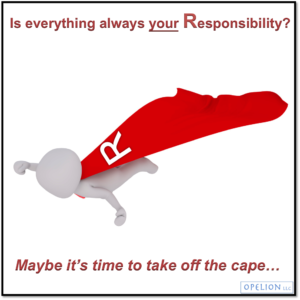Something must be done, but does that mean you must do it?
Too often, we take Responsibility for things others should do, or where t here is a shared responsibility, we assume we must shoulder it alone. You look around the table at a meeting and realize no one else is going to volunteer for an unwanted task, and there’s a voice inside you convincing you that you must volunteer. Why does the Responsibility rest on your shoulders?
here is a shared responsibility, we assume we must shoulder it alone. You look around the table at a meeting and realize no one else is going to volunteer for an unwanted task, and there’s a voice inside you convincing you that you must volunteer. Why does the Responsibility rest on your shoulders?
And, too often, we take Responsibility for far too many things. Your boss heaps yet another task onto your plate, and you just work harder and longer, rather than have a conversation about priorities. Yes, maybe only you can do that particular task, but at what expense to everything else, including your health and sanity?
At home, the Responsibility cape we wear has us doing all of the chores – maybe even taking over or redoing chores assigned to others – all while grumbling about how we seem to be the only ones who really care.
What signal are you sending?
By taking Responsibility, we enable the irresponsible behavior of others, send a signal that we are (or believe we are) all-capable, withhold the truth about how we really feel, and neglect our own needs. We’re also selling everyone else short when we assume only we can get things done.
It’s one thing if we’re talking about being home alone with a crying infant. With no one else there, we have to accept responsibility and take action. But if your significant other is there, do you automatically assume Responsibility, or do you have a conversation to determine shared responsibility? And if the entire team is at the table, and no one else is picking up the task, do you automatically assume is has to be you? The people around you know that if they don’t step up, things will still get done because you can’t help but raise your hand.
This pattern of behavior leads to burnout and resentment.
If you’re automatically taking Responsibility and then resenting it, that’s on you. So here’s where you do need to be taking responsibility:
- Be honest with others about how you truly feel
- Be honest with others about the impact on you
- Commit to taking better care of your needs
- Honor your commitments to yourself (e.g. leave work on time, exercise)
- Honor your relationships by talking about shared workload
- Have faith in the people around you by believing they are as capable as you are
- Have faith in the ability of others to understand your perspective
- Take care of yourself
- Take off the cape. You are neither victim nor hero.
Maybe you’ve made a career of being the one who picks up the slack, and it’s probably served you well – up to a point. If you make yourself indispensible in your current role, no one will want to promote you to something better or move you to something that expands your skills.
And if you’ve let yourself be a doormat, people will love what you do for them but won’t respect you or see you as a leader.
Next time, let someone else volunteer.
When your boss adds a task, have a conversation about priorities. If it feels like admitting failure to say you can’t do it all, remind yourself that your track record gives you credibility. At home, stop doing – or redoing – things others should do. Have conversations about sharing the workload. And remember, you deserve time for yourself, so be intentional about scheduling responsibility-free time to recharge.
Carol Robert is a coach, instructor and organizational culture change agent. Her workshops, coaching and hands-on organizational interventions have helped hundreds shift their behavior to find success in their work and more joy in their lives.
